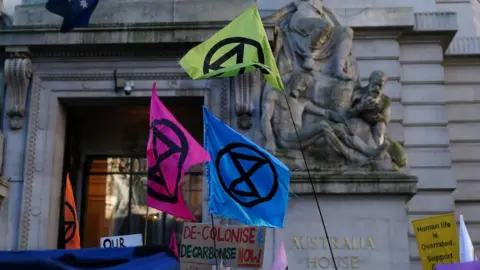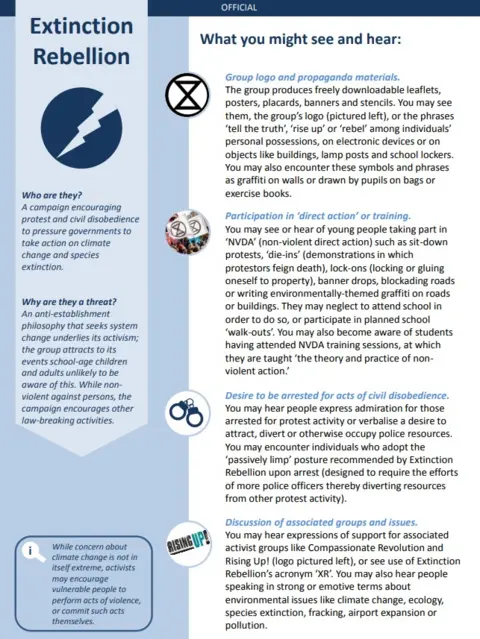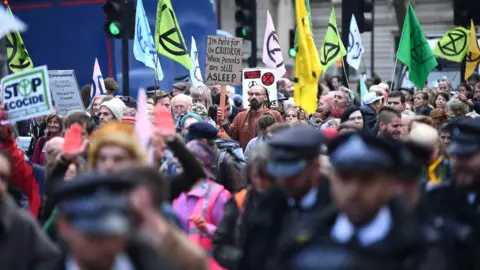Extinction Rebellion: Counter-terrorism police list group as 'extremist' in guide
 Getty Images
Getty ImagesCounter-terrorism police in south-east England have admitted an "error of judgement" after listing Extinction Rebellion as an "extreme ideology".
First reported in the Guardian, the police guide - aimed at stopping young people being radicalised - suggested referring those at risk of extremism to the government's Prevent programme.
"How dare they," said climate change group Extinction Rebellion.
Police are now reviewing and recalling the document.
The climate change group was listed alongside banned groups like National Action in the 12-page guide.
The document was produced by Counter Terrorism Policing South East - part of the national counter-terrorism policing network - and given to police forces and government organisations.
Called "safeguarding young people and adults from ideological extremism", the guide itself also says it was produced for those who work with young people or the public, as well as local authorities.
It was designed to help "recognise when young people or adults may be vulnerable to extreme or violent ideologies", it reads.
It says spotting one of the signs in isolation may not mean someone has been radicalised, but "in combination or in circumstances where they do not 'fit', they may indicate an individual at risk".
"In such cases, consider whether the individual is vulnerable to extremism and should be referred to the UK government's Prevent programme."
The Prevent programme is part of the government's counter-terrorism strategy and urges local communities to flag up anyone at risk of joining extremist groups and carrying out terrorist activities.
'Anti-establishment'
The guide lists several groups, such as the neo-Nazi group National Action and Islamist extremist group Al Muhajiroun - both of which are banned in the UK.
It also has pages on far-right youth network Generation Identity, extreme Satanism and animal rights extremism.
On the page about Extinction Rebellion, the guide describes the group as: "A campaign encouraging protest and civil disobedience to pressure governments to take action on climate change and species extinction."
Under the heading "why are they a threat?", the guide reads: "An anti-establishment philosophy that seeks system change underlies its activism; the group attracts to its events school-age children and adults unlikely to be aware of this.
"While non-violent against persons, the campaign encourages other law-breaking activities."
The guide says signs someone is involved in Extinction Rebellion might be the use of phrases like "rise up" or "rebel".
Or "you may see or hear of young people taking part in 'NVDA' (non-violent direct action) such as sit-down protests, 'die-ins'," the guide suggests.
 Counter Terrorism Policing South East
Counter Terrorism Policing South EastA spokeswoman for the Extinction Rebellion group said: "Teachers, grandparents, nurses have been trying their best with loving non-violence to get politicians and big business to do something about the dire state of our planet.
"And this is how the establishment responds."
In a statement, Det Ch Supt Kath Barnes, head of Counter Terrorism Policing South East, said: "I would like to make it quite clear that we do not classify Extinction Rebellion as an extremist organisation.
"The inclusion of Extinction Rebellion in this document was an error of judgement and we will now be reviewing all of the contents as a result.
"It was produced by CTPSE to assist our statutory partners - including police forces and government organisations - in identifying people who may [be] vulnerable as a result of their links to some organisations."
 PA Media
PA MediaDet Ch Supt Barnes added that the document was "designed for a very specific audience who understand the complexities of the safeguarding environment we work within and who have statutory duties under Prevent".
She said they are in the process of confirming who the guide has been shared with and recalling it.
"We as Counter Terrorism Policing, along with our partners, have a responsibility to protect vulnerable people. Officers are trained to spot those who may be vulnerable, and the membership of an organisation that supports environmental or animal welfare issues alone would not be a trigger."
